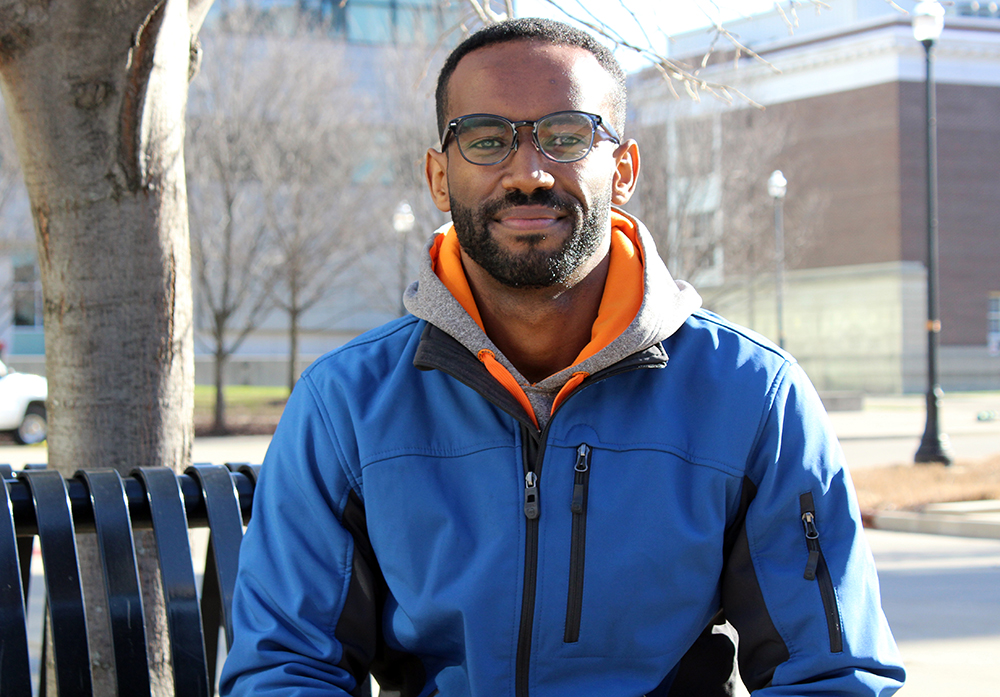Public Health Buckeyes: Andreas Teferra
Epidemiology PhD student explores link between tobacco use, health care access

Andreas Teferra, a fourth-year doctoral student in epidemiology, was studying nursing and epidemiology in Ethiopia and the Netherlands then came to Ohio State to pursue his research on health disparities among tobacco users.
Question and Answer
Can you tell us a little about yourself?
I was born and raised in Addis Ababa, Ethiopia. I have an ever-growing passion for public health research that is readily applicable, translatable and able to serve as a guide for effective health policies and interventions. My main research interest is in health disparities related with tobacco use and regulation, but I’ve also worked on topics related to chronic disease epidemiology and global health. In my spare time, I enjoy obsessing over European club soccer and spending time outdoors.
Why did you decide to pursue public health at Ohio State?
After working on my master’s degree and deciding to pursue further training in epidemiology, I focused on programs with mentors working on tobacco use/regulation and related topics. Aside from being a great research fit, I found Ohio State appealing for its diverse student body, abundant resources and its location in a vibrant and multicultural city.
Can you tell us more about your research?
My current work is looking at disparities in smoking status and health care access among rural Ohioans. My research also considers whether the expansion of Medicaid in Ohio has made a difference among these populations for rates of accessing health care. My past research has also looked at other at-risk populations, such as LGBTQ+ communities and tobacco use among youth. My master’s work at the University of Groningen in the Netherlands used data from a longitudinal study to see how the mortality rate of chronic obstructive pulmonary disease differed in people who had a specific marker of lung inflammation.
What are your goals after receiving your degree?
I would like to work in a setting that is engaged in collaborative and impactful research for the betterment of population health and reduction of health inequities. I would like an opportunity to continue learning from colleagues who are passionate while continuing my development as an independent researcher.
Are you involved in any academic, professional or student activities?
"I serve as a student ambassador in the college, and I’ve also served as a student representative for the Division of Epidemiology on the CPH Graduate Studies Committee. Outside of Ohio State, I serve as a co-chair for education for the Society of Epidemiologic Research’s Student and Postdoctoral Committee.
What advice would you give incoming students?
This is not necessarily novel advice, but it is essential to nurture a healthy work-life balance. Graduate school can be dauting and stressful, particularly during the COVID-19 pandemic, which led to monumental changes for students. Advocate for yourself, be a good communicator and don’t be afraid to ask for help when you feel stuck. It’s also important to choose a mentor wisely — work with someone who not only inspires and develops you in your research and studies, but who also cares about your health and well-being.
What do you hope for the future of public health?
The COVID-19 pandemic has brought public health to the forefront of everyday life like never before. My hope for public health is that it builds on this momentum to continue its progress as a field that is collaborative, global and interdisciplinary. I’d also like to see public health professionals continue promoting the need for effective and robust communication with the general public, policymakers and other stakeholders.
About The Ohio State University College of Public Health
The Ohio State University College of Public Health is a leader in educating students, creating new knowledge through research, and improving the livelihoods and well-being of people in Ohio and beyond. The College's divisions include biostatistics, environmental health sciences, epidemiology, health behavior and health promotion, and health services management and policy. It is ranked 22nd among all colleges and programs of public health in the nation, and first in Ohio, by U.S. News and World Report. Its specialty programs are also considered among the best in the country. The MHA program is ranked 5th and the health policy and management specialty is ranked 21st.